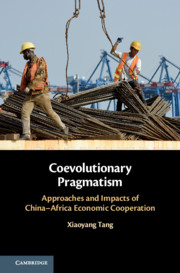Book contents
- Coevolutionary Pragmatism
- Coevolutionary Pragmatism
- Copyright page
- Dedication
- Contents
- Figures
- Tables
- Preface
- Foreword
- Abbreviations
- 1 A “Model” with No Model
- 2 Trade
- 3 Infrastructure
- 4 Agriculture
- 5 Manufacturing
- 6 Special Economic Zones
- 7 Employment and Training
- 8 Social and Environmental Responsibility
- Conclusion
- Index
6 - Special Economic Zones
Published online by Cambridge University Press: 24 December 2020
- Coevolutionary Pragmatism
- Coevolutionary Pragmatism
- Copyright page
- Dedication
- Contents
- Figures
- Tables
- Preface
- Foreword
- Abbreviations
- 1 A “Model” with No Model
- 2 Trade
- 3 Infrastructure
- 4 Agriculture
- 5 Manufacturing
- 6 Special Economic Zones
- 7 Employment and Training
- 8 Social and Environmental Responsibility
- Conclusion
- Index
Summary
A special economic zone (SEZ) is considered as a successful policy instrument in China’s own reform. Not only Chinese government and enterprises, but also African governments want to borrow this model to stimulate development in Africa. A handful of Chinese economic cooperation zones have been constructed in Africa since early 2000s, but the outcome was not satisfactory. By tracking the progress of six major cooperation zones, the author argues that there is no so-called “Chinese Model” of SEZ development. The key to SEZs’ success is to build synergism between the zones and the host countries’ structural transformation. Situated in very different political-economic contexts, the Sino-African cooperation zones struggle to build their connection with the development of host countries in terms of infrastructure harmonization, skill spillover, business linkage, and strategy coordination. However, after decade-long experiments, the zones have generated incremental policy impacts. Ethiopia, Egypt, and Zambia launched new industrial zone programs with Chinese participation, while other countries gave different degrees of support for building zones. Coupled with a large amount of inflowing manufacturing investments from China, the renewed initiative of zonal development is poised to impact Africa’s industrial landscape.
Keywords
- Type
- Chapter
- Information
- Coevolutionary PragmatismApproaches and Impacts of China-Africa Economic Cooperation, pp. 169 - 202Publisher: Cambridge University PressPrint publication year: 2021
- 1
- Cited by

